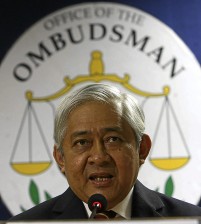MANILA, Philippines—Malacañang on Thursday defended the legality of the Disbursement Acceleration Program (DAP) before the Supreme Court saying the petitions questioning its legality “lacks merit” because there is “no genuine questions of law” but only misappreciation of facts.
In a consolidated comment, the government through the Office of the Solicitor-General said, contrary to the arguments raised by the petitioners that DAP is a fund not authorized by Congress and therefore unconstitutional, it is actually neither a fund nor an appropriation.
Solicitor-General
said DAP “is a program or an administrative system of prioritizing spending… As is obvious from its name, it is a program for accelerating disbursements.”
“What is only unstated in the title of the program—DAP is that the sources of the funds are from, first, the legitimately-generated savings of the government and second, the unprogrammed fund authorized in any relevant GAA,” the Solicitor-General said.
According to the Budget Department, DAP is a mechanism of public expenditure designed to fast-track public spending for priority program, activities and projects with the use of savings and the unprogrammed fund. It was the Aquino government’s solution to the decrease in the Gross Domestic Product (GDP) due mainly to the national government’s shrinking disbursement level, falling below target 16.1 percent.
There are eight petitions pending with the Supreme Court questioning the legality of DAP.
The petitioners said the use of the DAP violated Section 29 (1), Article VI of the Constitution which requires that: “No money shall be paid out of the Treasury except in pursuance of an appropriation made by law.”
They also pointed that appropriations law should originate from Congress.
But the Solicitor-General said no law is required for the creation of the DAP since “the President has the constitutional authority to create policies in the execution of laws.”
According to the OSG, the DAP was a necessary implication of the President’s authority as Chief Executive pursuant to Article VII, Section 17 of the Constitution and that the DBM is expressly empowered to issue rules and regulations “to carry into full effect the laws relating to matters within its jurisdiction” for the “achievement of more economy and efficiency in the management of government operations.”
“The President, through the DBM, implemented the DAP in order to accelerate public spending, push economic growth, and promote prudent fiscal management. This is a plain executive policy-making, nothing more,” the OSG explained.
The government counsel further pointed that no less than the Constitution allows the President to “augment any item in the general appropriations law for [his] office from the savings in other items of [his] appropriations.”
Also, the legislative authorization for the President’s exercise of his augmentation power is found in the General Appropriations Act, the Administrative Code and Section 44 of Presidential Decree 1177 or the Budget Reform Decree of 1977.
Section 44 of PD 1177 provides that “the President shall have the authority to transfer any fund appropriated for the different departments, bureaus, offices and agencies of the Executive Department which are included in the General Appropriations Act, to any program, project, or activity of any department, bureau or office included in the General Appropriations Act or approved after its enactment…The President shall, likewise, have the authority to augment any appropriation of the Executive Department in the General Appropriations Act, from savings in the appropriations of another department, bureau, office or agency within the Executive Branch, pursuant to the provisions of Article VIII, Section 16 (5) of the Constitution.”
RELATED STORIES:
P100M each for 6 senators from DAP
Aquino defends DAP; ex-Chief Justice seeks people’s action vs pork
